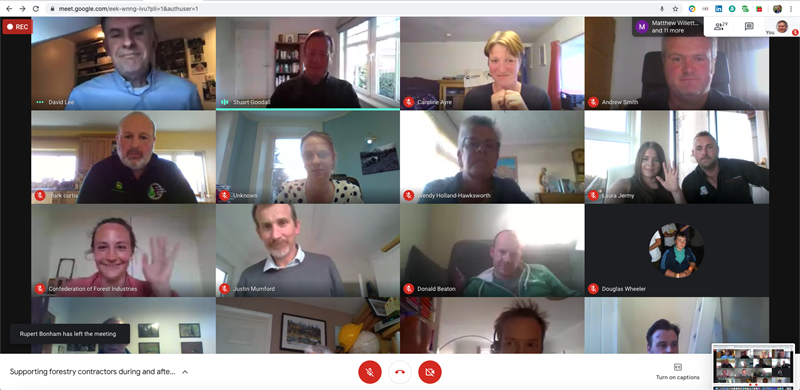Report on Covid-19 contractors webinar
The forestry sector faces real challenges in bringing through a new generation of contractors as the effects of Covid-19 impact on training, a Confor webinar was told.

Andrew Smith, a former contractor who now lectures and trains students at the Scottish School of Forestry (SSF), said social distancing guidelines created real challenges for the close-up, personal approach needed to train new machine operators in the forest.
"None of the contractors are focused on trainees at the moment," he told the webinar on supporting the contracting community. "It's too much of a burden on the business now in terms of costs and safety. There is no desire at the moment to take on trainees." SSF was looking at how to get students through the practical elements of the course in these difficult circumstances - but overall, student projections were still good, he said.
Mr Smith said friends in the industry had told him that "lots of guys cutting for the mills are parked up" and had been for about four weeks - but others cutting for the OSB mill [Norbord at Inverness] were still going. He also said that tonnage was down, with some contractors on about one-third of where they were before the crisis - creating cashflow challenges. However, he said that finance companies seemed to be responding fairly and allowing payment holidays (typically three months) on machinery finance agreements.
Hauliers were "a mixed bag", he said, with some parked up completely, others getting 2-3 days of work per week and some doing alternative haulage work.
He saw some positive signs, with so many people working in their gardens creating demand from DIY outlets, but said the construction industry re-starting was the key to activity really picking up.
Mark Curtis, a contractor who works in the Republic of Ireland, close to the border of Northern Ireland, painted a similar picture: "There are lots of experienced drivers sitting at home at the moment." He agreed with Mr Smith on the challenges with trainees, saying that the industry relied on "hands-on training, telling people what not to do as well as what to do".
Mr Curtis said the closure of many pubs and restaurants - and the dislike of caravans being parked up by local communities - had created challenges for contractors to easily find accommodation and places to eat, and they were turning more to Airbnb and renting apartments.
He also said more people seemed to be "popping up in the forest" than normal - a point also made by Toby Allen, a small contractor whose Say It With Wood business is based in Herefordshire.
Mr Allen described the impact of the virus on the business he runs with his partner Aly May: "When Covid-19 arrived, I was on a contract in Kent and I came home, uncertain whether to finish the contract. We talked to staff and generally they wanted to carry on, apart from a couple who had very understandable reasons not to. Confor was a big help in supporting us to continue, as people were going past wondering why we were still working - our yard is very visible."
Mr Allen said the business has reached "a kind of status quo" - the advice not to use chainsaws and loss of significant ash dieback work had created challenges with a summer of work disappearing, but he had been supported in finding alternative work, while garden fencing and firewood markets were picking up.
Caroline Ayre, Confor's National Manager for England, said contracting was the "kingpin" of the forestry sector and Confor had tried to support it in every way possible during the crisis. This included supplying letters of comfort and guidance on workers involved in critical supply chains, as well as new safe worksite protocols (drawn up in conjunction with the FCA) and featuring contractors, including Toby Allen and Martyn Neve, in a series of videos on why parts of the sector continued to work. Some of the videos have had in excess of 25,000 views on Facebook (watch them here).
She said chainsaw work was resuming in places on a common-sense, case-by-case basis - and highlighted useful market information captured in Confor's regular reports on critical supply chains (included in the weekly members' update). Getting saw logs to market was one particularly challenging issue, she said.
Asked by event host David Lee for positives which could come out of the current situation, Stuart Goodall, Confor's CEO, said as forestry was largely an outdoor-based industry - and with mills practising safe working - the sector could lead a green economic recovery.
Caroline Ayre repeated her comment from the first seminar, that the crisis had given the public a greater insight into the crucial role of forestry and wood in supporting critical supply chains.
And Mark Curtis thought the crisis had highlighted opportunities to complete paperwork online much more simply, quickly and efficiently - because it had to be done that way in the current circumstances. He also saw opportunities for the continued use of online medical appointments and email prescriptions for non-critical problems, which could help those working in remote locations.
Kate Williams of accountants King Morter Proud outlined self-employment support which could help contractors, due to go live on 13 May. Find out more here